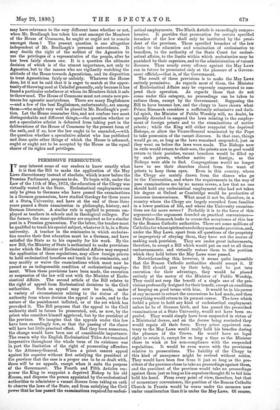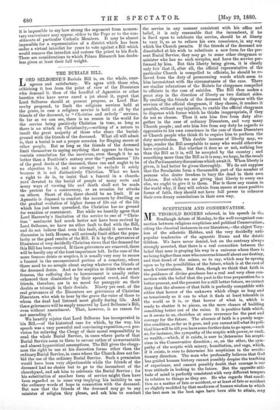PERMISSIVE PERSECUTION.
IT may interest some of our readers to know exactly what it is that the Bill to make the application of the May Laws discretionary instead of absolute, which is now before the Prussian Parliament, proposes to do. To begin with, under the Law of the 11th of May, 1873, the education of the Clergy was virtually vested in the State. Ecclesiastical employments can only be given to Germans who have passed the examinations in a German gymnasium, have studied theology for three years at a State, University, and have at the end of these three years passed a State examination in philosophy, history, and German literature. A similar rule is applied to persons em- ployed as teachers in schools and in theological colleges. For the former, the same qualifications are required as for a similar post in a Prussian gymnasium. For the latter, the teacher must be qualified to teach his special subject, whatever it is, in a State university. A teacher in the seminaries in which ecclesias- tics receive their first education must be a German, and have satisfied the State as to his capacity for his work. By the new Bill, the Ministry of State is authorised to make provisions under which the Minister of Ecclesiastical Affairs may suspend the application of these regulations, may allow foreign priests to hold ecclesiastical benefices and teach in the seminaries, and may modify or waive the examinations which must now be passed as an indispensable condition of ecclesiastical employ- ment. When these provisions have been made, the execution or suspension of the law will rest with the Minister of Eccle- siastical Affairs. The second article of the Bill relates to the right of appeal from Ecclesiastical decisions to the Civil authorities. Such an appeal may now be made, under a variety of circumstances relating to the status of the authority from whose decision the appeal is made, and to the nature of the punishment inflicted, or of the act which has provoked it. The Bill proposes that the appeal to the Civil authority shall in future be prosecuted, not, as now, by the priest who considers himself aggrieved, but by the president of the province. We imagine that the appeals under this law have been exceedingly few, so that the passing of the clause will have but little practical effect. Had they been numerous, the change would have been one of considerable importance. The reason why the English Ecclesiastical Titles Act remained inoperative throughout the whole term of its existence was in part the limitation of the right of prosecuting offenders to the Attorney-General. When a priest cannot appeal against his superior without first satisfying the president of the province that the case is a proper one to be so dealt with, there will be no appeals, except when it suits the purpose of the Government. The Fourth and Fifth Articles em- power the King to reappoint a deprived Bishop to his old diocese, and dispense the person appointed by the ecclesiastical authorities to administer a vacant diocese from taking an oath to observe the laws of the State, and from satisfying the Civil power that he has passed the examinations required for ecclesi-
astical employments. The Ninth Article is exceedingly compre- hensive. It provides that prosecution for certain specified breaches of the law shall only be instituted by the presi- dent of the province. These specified breaches of the law relate to the education and nomination of ecclesiastics to benefices, to the authority of the State Court for ecclesi- astical affairs, to the limits within which ecclesiastics may be punished by their superiors, and to the administration of vacant dioceses. Thus nearly every offence against the May Laws can in future be prosecuted only at the pleasure of a Govern- ment official,—that is, of the Government.
The result of these provisions is to make the May Laws entirely permissive. As regards most of them, the Minister of Ecclesiastical Affairs may be expressly empowered to sus- pend their operation. As regards those that do not come under this category, no proceedings can be taken to enforce them, except by the Government. Supposing the Bill to have become law, and the clergy to have shown what Prince Bismarck considers a sufficiently submissive and duti- ful spirit, the Minister of Public Worship will, no doubt, be speedily directed to suspend the laws relating to the employ- ment of foreign priests and to the examinations of native priests ; while the King will either reappoint the deprived Bishops, or allow the Vicars-General nominated by the Pope to take possession of the vacant dioceses. In that case, things would go on, so long as the laws remained suspended, just as they went on before the laws were made. The Bishops now in exile would return to their sees, the priests now in gaol would return to their parishes, vacant benefices would be filled up by such priests, whether native or foreign, as the Bishops were able to find. Congregations would no longer have to see their churches closed from the want of priests to keep them open. Even in this country, where the Clergy are mainly drawn from the classes who go to the Universities, and where the requirements in the way of pass examinations are by no means severe, a law that no one should hold any ecclesiastical employment who had not taken his degree at Oxford or Cambridge would be productive of immense inconvenience. What must it not be, therefore, in a country where the Clergy are largely recruited from families in a lower position of life, and where the University examina- tions are far more severe Probably it is to the force of this argument—the argument founded on practical convenience— that Prince Bismarck looks to secure the acceptance of this law by the Roman Catholic authorities. There are some millions of Catholics for whose spiritual needs they must make provision, and, under the May Laws, apart from all questions of the propriety or impropriety of obeying them, they have not the means of making such provision. They are under great inducements, therefore, to accept a Bill which would put an end to all these embarrassments, and virtually restore them to the position which they held before the May Laws were passed.
Notwithstanding this, however, it seems quite impossible that the Roman Catholic authorities should accept it. If the Bill should pass by their help, and be put into execution for their advantage, they would be placed entirely at the mercy of the Minister of Public Worship. They could not reap the benefit of a single one of the pro- visions professedly designed for their benefit, except on condition of keeping on good terms with him. It would be in his power at any moment to retract the concessions he had made, and then everything would return to its present course. The laws which forbid a priest to hold any kind of ecclesiastical employment unless he be of German birth, and has passed the prescribed examinations at a State University, would not have been re- pealed. They would simply have been suspended in virtue of a Ministerial decree, and on the decree being rescinded they. would regain all their force. Every priest appointed con- trary to the May Laws would really hold his benefice during the pleasure of the Crown. He would have no legal right to retain it, except for so long a time as the Minister-
chose to wink at his non-compliance with the suspended regulations. It would be even worse with the provisions relative to prosecutions. The liability of the Clergy to
this kind of annoyance might be revived without notice. They would have been free from it just so long as the pre-
sident of the province chose to take no proceedings against them, and the president of the province would take no proceedings against them just so long as his superiors thought fit to bid him
hold his hand. From every point of view, therefore, but that of momentary convenience, the position of the Roman Catholic Church in Prussia would be worse under the measure now =der consideration than it launder the MagLawe, Of course, it is impossible to say how strong the argument from momen- tary convenience may appear, either to the Pope or to the con- stituents of particular Catholic Members. It may be almost impossible for a representative of a district which has been under a virtual interdict for years to vote against a Bill which would remove the interdict and restore the priest to his flock. These are considerations to which Prince Bismarck has doubt- less given at least their full weight.



































 Previous page
Previous page